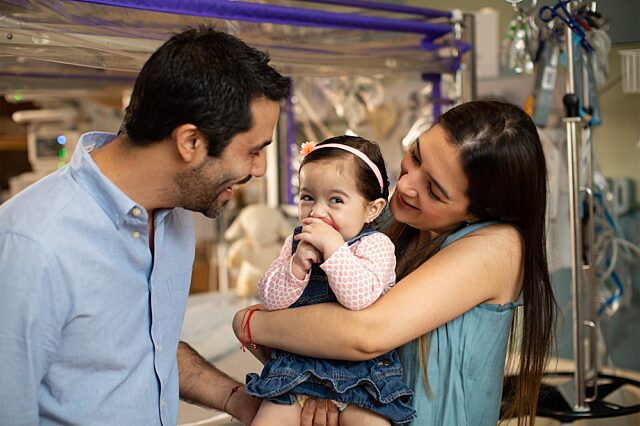Artificial heart gives a baby girl a second chance at life

This story is a follow-up to “How an artificial heart brought a bubbly baby’s smile back” that was published in January 2018.
For more than half of her life, 15-month-old-Valeria Ocampo lay in her hospital crib and peeked toward her window. On the 10th floor of the UF Health Shands Children’s Hospital, she waited for a new heart to arrive. And waited. For months, Valeria was connected to the Berlin Heart®, an artificial heart device made specifically for babies and children facing heart failure.
But in March, clinicians noticed that part of the device had not been working properly. After performing an echocardiogram, also known as a sonogram of the heart, Mark Bleiweis, M.D., the director of the UF Health Congenital Heart Center and the chief of congenital cardiothoracic surgery at the UF Health Congenital Heart Center, noticed something unusual. Valeria’s heart was overriding the device. She was improving.
Valeria Ocampo became the first patient in the pediatric cardiac intensive care unit, or PCICU, at the UF Health Shands Children’s Hospital to be weaned off the Berlin Heart® without the need of a heart transplant.
Since August 2017, Victoria Escobar and Carlos Ocampo, Valeria’s parents, had tried to make life at the hospital as routine as possible. Victoria would set scheduled meals and family members would clean surfaces in Valeria’s hospital room as they would routinely at home.
As Valeria’s condition worsened, she was placed on the Berlin Heart® to serve as a bridge to transplantation. After months of waiting for a new heart, doctors were astounded at the progress Valeria was making toward recovery. In fact, Valeria had been meeting all the criteria to wean her off the device at bedside – a procedure that had never been done at UF Health. Bleiweis and his team contacted the Berlin Heart® manufacturer to discuss the planning process for completing such a task.
In early March, clinicians in the PCICU gradually lowered her dependency on the machine and performed an echocardiogram each day to evaluate her heart function. Valeria’s heart performance remained consistent and the process was carried out for two weeks. The team of physicians from the UF Health Congenital Heart Center met frequently to review Valeria’s case. Bleiweis, along with Joseph Philip, M.D., the medical director of the pediatric cardiac intensive care unit; Ahmed Asfari, M.D., a fellow in the unit; Desiree Machado, M.D., a pediatric cardiologist; and Himesh Vyas, M.D., a pediatric interventional cardiologist, were in Valeria’s room to witness the transition.
On March 21, the machine was turned off. Valeria’s heart continued to pump.
“Everyone had red eyes, watery eyes. Everyone was in shock,” Victoria said. “Everything that could’ve been very negative was very positive all the time.”
On April 2, Valeria had the device surgically removed by Bleiweis and his operating team. A surgery that was expected to last hours was completed in just 55 minutes.
“She was reborn. As Dr. Bleiweis said, ‘She’s going to be born again after surgery,’ and that’s exactly what happened,” Carlos said.
“There are no words to describe how Dr. Bleiweis is as a doctor and as a person. We love him forever and ever. He’s our hero,” Victoria said. “We are very lucky that we got to meet him and that he got to work with her.”
“Valeria and her family have touched the lives of our clinicians in many ways,” Bleiweis said. “It has been our privilege to care for Valeria over the past eight months, and to see her achieve milestones, like celebrating her first birthday in the unit. We feel that we’ve become a part of their family and they’ve become a part of ours.”
Valeria and her family were discharged from the hospital 11 days after surgery.
“Our team at the UF Health Congenital Heart Center is beyond thrilled with the progress that Valeria has made while in the care of our pediatric cardiac intensive care unit,” Bleiweis said. “Her and her family’s resilience and hope has resonated with so many congenital heart families. Valeria’s miraculous journey is an example of the exemplary care our team strives to provide on a day-to-day basis to give each child a fighting chance.”
“Our experience at UF Health was amazing,” Victoria said. “I feel like I was hospitalized with her.
“All the staff here is very skilled, very caring,’’ she said. “They treated her as if she was theirs. I really appreciated all of the nurses and the bonds we created with them. We had a great experience if you remove the pain for having her – everything was a great experience. If a parent asks for me advice, just try to live a normal life and try to be near to your baby. We brought home to the room. She never understood she was going through so much.”
About the author
